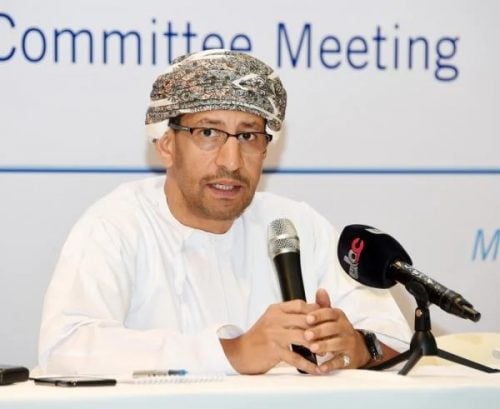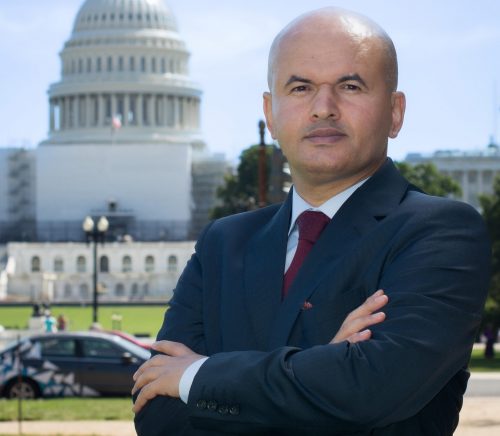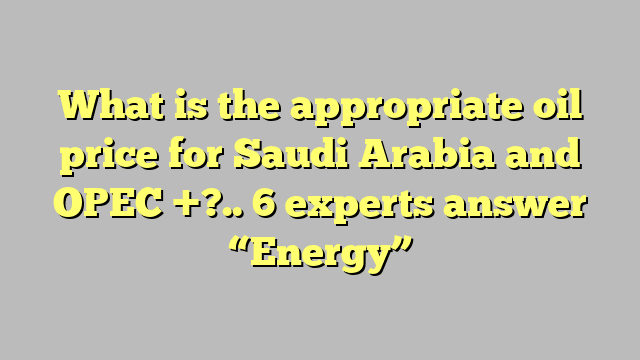The decision of the members of the OPEC + coalition to reduce the production ceiling by two million barrels, starting from November (2022) until December (2023), shocked the energy markets, and angered the United States and countries consuming black gold.
The aim of the decision was to boost oil prices, which have fallen to levels below $90 a barrel.
Although the United States described the decision of OPEC + as “short-sighted”, member states kept the production policy unchanged in January (2023).
And with many experts expecting a rise in oil prices, the question that arises strongly on the scene: Is the oil price at the level of $90 a barrel satisfactory to Saudi Arabia and the OPEC + countries?
In this context, a number of experts revealed – in statements to the specialized energy platform – a vision and their point of view regarding the most appropriate price for the alliance to guarantee its interests.
Avoid talking about prices
The advisor and expert in the field of energy in the Sultanate of Oman, Ali bin Abdullah Al Riyami, former Director General of Marketing at the Omani Ministry of Energy and Minerals, said that OPEC and OPEC + usually avoid talking about prices, and this is a sensitive issue – also – for the United States and Europe, despite their clear interference with the ceiling update. The price of Russian oil, noting that it is against the principles of capitalism.

He believes that oil prices above 70 and 80 dollars per barrel are suitable for OPEC, as the higher prices add some comfort to OPEC members and any oil producer in general.
He said, “However, OPEC meetings look at the data of the oil markets, supply and demand, and geopolitical conditions to take all of that into account, and then decide: either to decrease production or increase it.”
He added that prices could rise to $90 a barrel in the coming months, if conditions change, but he ruled out that happening at the present time.
Nader Etim, an analyst for oil markets in the Middle East at the Argus Media platform specializing in energy affairs, agreed with this head.
He said that OPEC+ countries and the group in general will not talk about oil prices. Because it insists – always – that what drives its policy are the fundamentals, and what is appropriate for the market, instead of determining the price of oil during a specific period.
“However, officials from OPEC + will discuss prices privately,” he continued.
As for talking about whether the price is $90 per barrel, it is believed that all countries in the coalition will be satisfied at those levels.
Factors to take into account
In turn, Paul Hiken, an expert in commodity market analysis at Standard & Poor’s Global Platts, believes that OPEC + should take into account the impact of the price of $ 90 a barrel on inflation and destroying demand, and how long this will continue, and the extent to which high prices accelerate policies that encourage energy transition.
It is believed that the price range between 80-90 dollars a barrel is suitable for OPEC +, and it was often talked about a suitable price at 60-70 dollars a barrel, but after two years of the Corona pandemic and the decline in prices and demand, the goals may have changed now.
He said, “It seems that these prices are testing the patience of consuming countries without prompting them to release more strategic oil stocks and destroy demand, but at a limited rate.”
While the founder of the “Vanda Insights” Center on Energy Markets, Vandana Hari indicated that OPEC + producers prefer to see oil prices above $ 90, and she believes that the alliance does not realize that these estimates are not only unrealistic for 2023, but also inappropriate in light of the continuing and high inflation. And facing the global economy headwinds.
Harry believes that the attempt to fabricate prices and keep them high during the economic downturn may backfire, and end up accelerating the erosion of oil demand.
You believe that OPEC+ will try to defend a price floor of $70.
Adapting to future changes
For energy and Middle East expert Cyril Woodershoven, the market has a responsibility to set prices.
He said, “For most OPEC countries, the price of $90 is very appropriate… It is much higher than what the total government budgets should be based on, and it makes the market more realistic, and OPEC + members have the ability to adapt to future changes.”

He warned against linking oil prices to GDP. Because the financial market is down, government debt is much less of a push to raise prices.
And he went on to explain, “OPEC should consider production costs in general and the gross profit margin … and the budget for GDP or the government should not depend entirely on the income of the rentier state.”
While the senior adviser on foreign policy and energy geopolitics in Washington, Dr. Omod Shukri, answered this question, that the decline in raw material prices in the markets has an impact on the economic growth of OPEC.
He said, “OPEC believes that adjusting the monetary policy of the US Central Bank, the continuous decline in commodity prices, and resolving tensions in Eastern Europe, may lead to an increase in oil prices, or at least achieving balance in the market.”
He indicated that the OPEC+ alliance is satisfied with the conditions in the market, adding that the price increase in 2023 will benefit member states.
He also stressed that the Kingdom of Saudi Arabia, Russia and the UAE will play a fundamental role in making OPEC + policy for the current year.
He pointed out that Saudi Arabia – the world’s largest exporter of crude oil – did not back down from its position, even with the oil market losing all profits.
However, economic stagnation in such circumstances represents a grave danger. Because the increase in energy costs and the growth of interest rates in the coming months will affect demand.
related topics..
Also read..

Leave a Reply